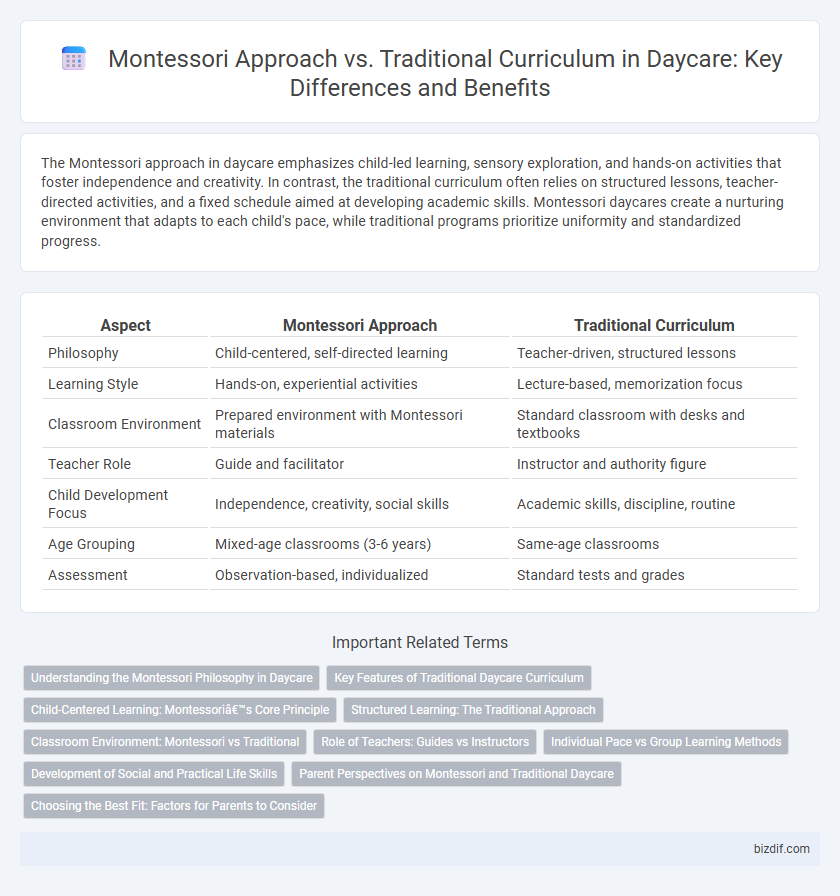The Montessori approach in daycare emphasizes child-led learning, sensory exploration, and hands-on activities that foster independence and creativity. In contrast, the traditional curriculum often relies on structured lessons, teacher-directed activities, and a fixed schedule aimed at developing academic skills. Montessori daycares create a nurturing environment that adapts to each child's pace, while traditional programs prioritize uniformity and standardized progress.
Table of Comparison
| Aspect | Montessori Approach | Traditional Curriculum |
|---|---|---|
| Philosophy | Child-centered, self-directed learning | Teacher-driven, structured lessons |
| Learning Style | Hands-on, experiential activities | Lecture-based, memorization focus |
| Classroom Environment | Prepared environment with Montessori materials | Standard classroom with desks and textbooks |
| Teacher Role | Guide and facilitator | Instructor and authority figure |
| Child Development Focus | Independence, creativity, social skills | Academic skills, discipline, routine |
| Age Grouping | Mixed-age classrooms (3-6 years) | Same-age classrooms |
| Assessment | Observation-based, individualized | Standard tests and grades |
Understanding the Montessori Philosophy in Daycare
The Montessori philosophy in daycare centers on fostering independence, sensory exploration, and self-paced learning through hands-on activities, contrasting with the structured, teacher-led traditional curriculum. Emphasizing child-centered environments, Montessori classrooms provide specially designed materials that cultivate natural curiosity and cognitive development. This approach supports holistic growth by integrating practical life skills, social interaction, and academic foundations tailored to each child's needs.
Key Features of Traditional Daycare Curriculum
The traditional daycare curriculum emphasizes structured routines, teacher-led activities, and a focus on foundational academic skills such as counting, letter recognition, and basic writing. Social skills development is guided through group activities and playtime, while cognitive growth is supported by repetitive exercises and direct instruction. This approach prioritizes measurable milestones and standardized assessment methods to track children's progress.
Child-Centered Learning: Montessori’s Core Principle
The Montessori approach centers on child-centered learning, emphasizing independence, hands-on activities, and self-paced exploration to foster natural development. Unlike traditional curriculum, which often relies on structured, teacher-led instruction, Montessori encourages children to follow their interests within a prepared environment designed to develop cognitive and social skills. This method supports intrinsic motivation and personalized growth, aligning with developmental milestones to promote holistic learning in early childhood education.
Structured Learning: The Traditional Approach
The traditional curriculum in daycare emphasizes structured learning through a fixed schedule, teacher-led activities, and standardized lessons designed to meet developmental milestones. This approach prioritizes consistency and measurable progress in areas such as literacy, numeracy, and motor skills. Children experience repetitive exercises and clear expectations, fostering discipline and routine within the daycare environment.
Classroom Environment: Montessori vs Traditional
Montessori classrooms feature child-centered environments with natural materials, open spaces, and designated areas promoting independence and sensory exploration. Traditional classrooms typically have structured layouts with teacher-led desks arranged in rows, emphasizing uniformity and group instruction. This environment in Montessori settings fosters self-directed learning, while traditional classrooms rely more on guided activities and direct supervision.
Role of Teachers: Guides vs Instructors
Montessori teachers act as guides who facilitate self-directed learning, creating an environment where children explore and discover at their own pace. In contrast, traditional curriculum instructors follow a structured plan, delivering lessons and assessing knowledge through standardized methods. This distinction emphasizes the Montessori focus on individualized development versus the traditional emphasis on uniform instruction.
Individual Pace vs Group Learning Methods
The Montessori approach emphasizes individualized learning, allowing children to progress at their own pace through hands-on, self-directed activities that foster independence and critical thinking. In contrast, traditional curricula typically follow a structured group learning model with predefined schedules and standardized assessments, promoting social interaction but potentially limiting personalized growth. Research indicates that individualized pacing in Montessori settings enhances cognitive development and motivation by catering to each child's unique learning needs.
Development of Social and Practical Life Skills
The Montessori approach emphasizes hands-on activities and child-led learning, fostering independence and collaboration among peers, which enhances social development and practical life skills. Traditional curricula often rely on teacher-directed instruction, focusing on structured group activities that develop social interaction but may limit spontaneous skill-building. Research shows Montessori students demonstrate stronger problem-solving abilities and adaptability in real-life social situations compared to those in conventional daycare settings.
Parent Perspectives on Montessori and Traditional Daycare
Parents often choose Montessori daycare for its child-centered approach, emphasizing hands-on learning and fostering independence, which many believe supports holistic development. Traditional daycare curriculum is typically more structured, offering a predictable routine and teacher-led activities that appeal to parents valuing consistency and academic readiness. Surveys reveal that parents perceive Montessori programs as promoting creativity and social skills, while traditional daycare is favored for early literacy and numeracy foundations.
Choosing the Best Fit: Factors for Parents to Consider
When choosing between Montessori and traditional daycare curricula, parents should evaluate their child's learning style, emphasizing Montessori's hands-on, self-directed approach versus the structured, teacher-led activities of traditional programs. Consider factors such as the child's independence, social development needs, and the daycare's adaptation of each method to foster creativity and critical thinking. Assessing staff qualifications, classroom environment, and alignment with family values helps ensure the best educational fit for the child's growth and happiness.
Montessori approach vs Traditional curriculum Infographic

 bizdif.com
bizdif.com